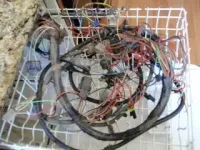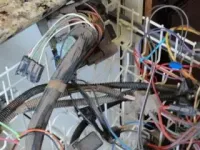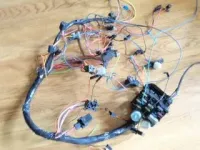NOT EVEN CLOSE TO REALITY
Fred,
I promised myself that I wasn't going to respond to any of ~ XXXXXXX.....
I live in Missouri. We get a moderate amount of snow. During the winter months they coat our streets and highways with salt and other corrosive chemicals to melt the ice and snow. That stuff mixes with the snow to create slush. Perhaps you've heard of it? Anyway, all the wires under our vehicles for lights, starters, fuel pumps on fuel injected vehicles, and the wire to your fuel sender are soaked in this salty slush frequently, and it some times doesn't get thouroughly washed off for months. I would think this would be much harder on them than a half hour in the dish washer. These wires I mentioned do not instantly corrode apart or stop working. It takes many years for them to start showing signs of wear. I soaked my wires and fuse box in degreaser and water from the hose for more than an hour while scrubbing them. I would think this would be just as harmfull as running them through a dish washer cycle, and yet, my wires and fuse box show absolutely no sign of corrsion.~ XXXXX ~ And I'll say it again, EVERYONE on this forum including you has something to teach others, and every one of us including you has things we could learn from others. If you'd come on here saying you or someone you personally know had used the dish washer on a harness and it caused it harm, then I would put more weight into your theory.
Sorry for the thread jack Chodette.

Rescue,
XXXXX ~
The PM does not mention 4.0 head
nor the second comment
If so why did you not post them
So lets post them and let the forum read them all
No we won't PM's. PM's are private messages and will not be made public. They can be forward to me or reported. --CJ
Well dude....
Let the forum read your ~ XXXX.
Further.....
I lived in St. Louis MO TOO... Sales Enginee for AMP calling on McDonnel Douglas Aircraft and Emerson Electronics & Space. Two customers several million in sales/yr for connectors and wire harness producton equipment. I worked on the design, production equipment, wire harness production, printed circuite board packaging, design, production. Products F15 AirForce, F18 Navy, AV8B Marines, and missles, fiber guided munitions, test, satalites and more. I worked with design engineer, mfg engineers and trained their line workers on production the correct way.
I was their only AMP contact local. I was also rated top ten Sales Engineer twice.
I can teach Air Craft builder how to build a wire harness but cannot help here on the internet..... Man you picked the wrong battle and wrong subject.
So yes, I know st louis and I know wire harness needs. I gave a few examples the other day and you seem to keep missing or over reading things.
May I suggest you clean your weight belt in the dish washer it will come out bright and shinny.... will attact more fish. Can be stored on the dinning room table to remind you off all the fun underwater. Fondle it often while you eat and you and the misses can dream about the last time you were on coral reef. Do not forget to let junior have some fun and dream along too. Maybe in a few years he will be so brain dead he will think he is on the beach 100% of the time.....
ow the joyes of LEAD POISIONING.
ANY one or situation that mixes industrial contamination with your food, food prep & cooking, cleaning and pots/pans, kitchen sink, and your food prep and eating surfaces is a roll of the dice. Just too many chemicals, leads, heavy metals to take that risk..... WHY DO IT
Because Rescue, Cheepjeep or pics on the internet say its ok. Think about it you only get one shot a living. ESP from guys that have such a poor reading level.
Just for fun.....
PM's Removed -CJ





